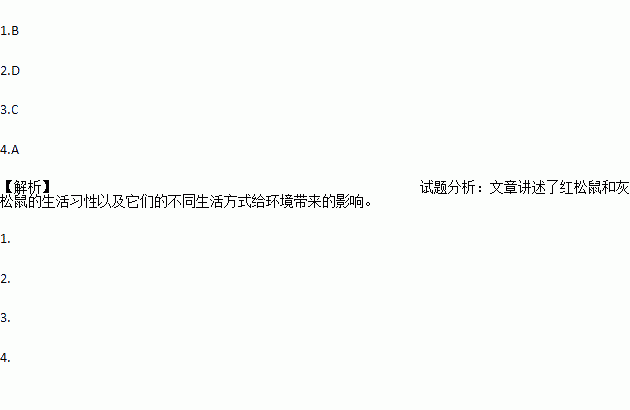题目内容
Winter begins in the north on December 22nd. People and animals have been doing what they always do to prepare for the colder months. Squirrels (松鼠), for example, have been busy gathering nuts from trees. Well, scientists have been busy gathering information about what the squirrels do with the food they collect.
They examined differences between red squirrels and gray squirrels in the American state of Indiana. The scientists wanted to know how these differences could affect the growth of black walnut (黑胡桃) trees. The black walnut is the nut of choice for both kinds of squirrels. The black walnut tree is also a central part of some hardwood forests.
Rob Swihart of Purdue University did the study with Jake Goheen, a former Purdue student now at the University of New Mexico. The two researchers estimate that several times as many walnuts grow when gathered by gray squirrels as compared to red squirrels. Gray squirrels and red squirrels do not store nuts and seeds in the same way. Gray squirrels bury nuts one at a time in a number of places. But they seldom remember where they buried every nut. So some nuts remain in the ground. Conditions are right for them to develop and grow the following spring. Red squirrels, however, store large groups of nuts above ground. Professor Swihart calls “death traps for seeds”.
Gray squirrels are native to Indiana. But Professor Swihart says their numbers began to decrease as more forests were cut for agriculture. Red squirrels began to spread through the state during the past century.
The researchers say red squirrels are native to forests that stay green all year, unlike walnut trees. They say the cleaning of forest land for agriculture has helped red squirrels invade Indiana. Jake Goheen calls them a sign of an environmental problem more than a cause.
1.The study done by Rob Swihart and Jake Goheen is to ________.
A. find out the living conditions for squirrels
B. learn squirrels’ influence on black walnut trees
C. do something to get rid of squirrels
D. save the forests in the American state of Indiana
2.The difference between gray squirrels and red squirrels mainly lies in ________.
A. the way they gather the walnut
B. the time they have winter sleep
C. the place they have winter sleep
D. the place they store the walnuts
3.When Professor Swihart says “death traps for seeds”, he actually means that ________.
A. red squirrels eat more nuts than gray squirrels
B. gray squirrels and red squirrels will have severe fights
C. nuts above the ground will not develop into plants
D. seeds can be traps for other animals in the forest
4.According to the passage, which of the following is true?
A. The black walnut is equally attractive to both gray and red squirrels.
B. Gray squirrels do more harm to the forest than red squirrels.
C. Red squirrels and gray squirrels have helped the spread of walnut trees.
D. The cleaning of forest land benefits red squirrels directly.


